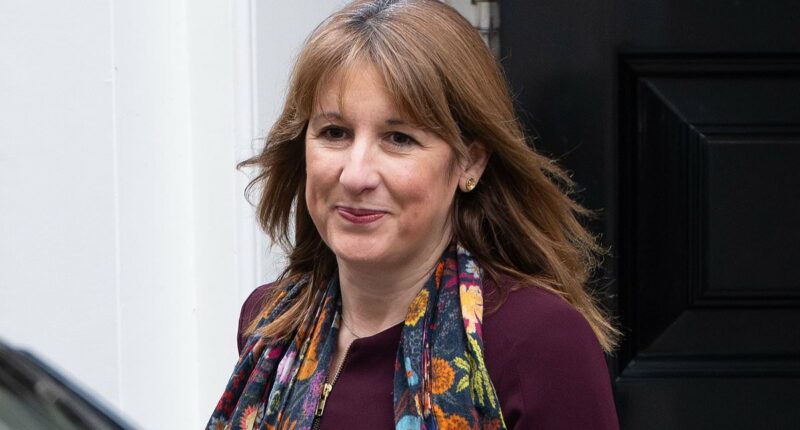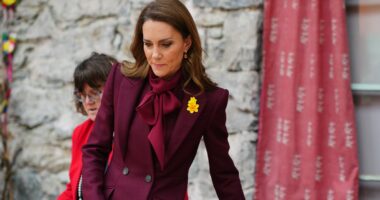Share this @internewscast.com
Rachel Reeves finds herself on shaky ground as she approaches next week’s Budget, with recent data revealing that government borrowing in October exceeded expectations.
The Office for National Statistics (ONS) reported that public sector borrowing reached £17.4 billion last month. Although this represents a decrease of £1.8 billion compared to the previous year, it remains the third-highest borrowing figure for October since records have been kept.
Economists had anticipated borrowing to be around £15 billion, yet the actual figure surpassed that, reaching even beyond the £14.4 billion predicted by the Office for Budget Responsibility (OBR).
So far, in the current financial year, total borrowing has hit £116.8 billion. This marks an increase of £9 billion from the same period last year and exceeds the OBR’s forecast from March by £9.9 billion.
This financial strain surfaces just days before Ms. Reeves is set to present her Budget on November 26, amidst concerns of a significant deficit in public finances.
It comes less than a week before Ms Reeves’ Budget on 26 November, ahead of which she is thought to be facing a multi-billion pound hole in the public finances.
Despite a chaotic U-turn on plans to hike income tax, the Chancellor is still expected to announce a ‘smorgasbord’ of fresh levies in a desperate bid to raise cash.
But the Tories demanded she instead focus on controlling Government spending in a bid to avoid further tax pain for Brits.

Rachel Reeves has been dealt a fresh blow ahead of next week’s Budget as latest figures showed higher-than-expected Government borrowing last month

Total borrowing in the financial year to date was £116.8billion – some £9billion higher than the same period a year ago and £9.9billion above the OBR’s forecasts in March
Shadow chancellor Sir Mel Stride said: ‘Borrowing so far this year has been the highest on record outside the pandemic.
‘If Labour had any backbone, they would control spending to avoid tax rises next week.
‘While Labour plan to spend more and more, Conservatives would cut the deficit and cut taxes with our golden economic rule and our £47billion savings plan.’
Nick Ridpath, an economist at the Institute for Fiscal Studies think tank, urged the Chancellor to grant herself a bigger buffer against her fiscal rules at the Budget.
‘Today’s figures show that Government borrowing has continued to exceed the OBR’s forecast for the year to date, to the tune of around £10billion,’ he said.
‘This overshoot is driven by a combination of lower-than-expected tax receipts and higher-than-expected borrowing by councils and other bodies outside of central government control.
‘What this highlights is that forecasts for the level of borrowing this year are subject to considerable uncertainty, never mind those for borrowing in four or five years’ time.
‘Operating with minimal fiscal margin for error is risky, and this is one reason why the Chancellor might sensibly take steps to increase her so-called ‘fiscal headroom’ at next week’s Budget.’
Liberal Democrat MP Daisy Cooper, the party’s Treasury spokesperson, said: ‘This is just the latest reminder that the Government is failing to turn things around – they lack any clear vision for our economy.
‘At the Budget we need a proper plan to kickstart growth, starting with a new UK-EU customs union.’
There was further grim news for Ms Reeves on Friday as retail sales were shown to have falled unexpectedly last month for the first time since May.
In the latest sign of consumer caution ahead of the Budget, official figures showed retail sales by volume fell 1.1 per cent during October.
This followed an upwardly revised increase of 0.7 per cent in September.
Most economists had forecast for retail sales to remain unchanged month-on-month in October.
In the three months to October, the ONS said retail sales lifted 1.1 per cent compared with the previous three months, as gains in August and September offset last month’s decline.
The figures follow a raft of retailers reporting that shopper spending has pulled back due to uncertainty over the Budget, including high street stalwart Marks & Spencer.
And figures out separately from GfK on Friday showed consumer confidence has fallen across all measures this month as it said the public is ‘bracing for difficult news’.
Treasury minister James Murray said next week’s Budget would set out how Ms Reeves intends to ‘cut debt’.
He said: ‘Currently, we spend £1 in every £10 of taxpayer money on the interest of our national debt.
‘That money should be going to our schools, hospitals, police and armed forces.
‘That is why we are set to deliver the largest primary deficit reduction in both the G7 and G20 over the next five years – to get borrowing costs down.’
The ONS figures showed public sector borrowing was revised lower by £400million for the first six months of the financial year.
ONS chief economist Grant Fitzner said: ‘Borrowing this October was down on the same month last year, although it was still the third-highest October figure on record in cash terms.
‘While spending on public services and benefits were both up on October last year, this was more than offset by increased receipts from taxes and National Insurance contributions.’

















